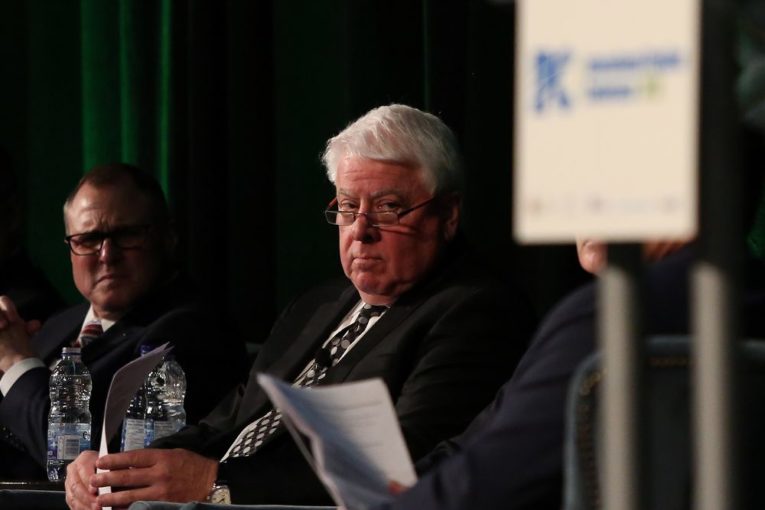
Speaking before the Grey Cup last November, Premier Rachel Notley told a Calgary business audience that the Trans Mountain pipeline expansion was “on the one-yard line.”
To date, no touchdown has been scored. In fact, the ball has been moving in the wrong direction recently.
Today, the federally owned oil pipeline is stuck in limbo with no firm date for construction to resume after a recent court ruling quashed its approval.
But the CEO of Trans Mountain Corp., the federal Crown corporation in charge of the oil pipeline, believes the project is still firmly within scoring range. Construction could restart sometime in 2019, if problems identified by the judges are properly addressed.
“I think the quarterback got sacked a couple of times and we may be back on the 25 (yard line) — you’re still in field goal range,” Ian Anderson told reporters Wednesday, before addressing the International Pipeline Conference in Calgary.
“I remain confident … I am just hopeful we can get through this next chapter and get back to work next year.”
Last month, the Federal Court of Appeal nullified the project’s approval, citing inadequate consultation with First Nations communities by the government, and improper consideration by the National Energy Board of the impact of tanker traffic tied to almost tripling the existing pipeline’s capacity.
The ruling put an immediate halt to construction on the pipeline, which extends from the Edmonton area to Burnaby, B.C., and it put hundreds of contractors out of work. (About 2,000 people were working on the project at the time, a number that was expected to expand to 5,000 by January.)
Anderson, president of Kinder Morgan Canada since 2005 — until Ottawa bought the project this year — acknowledged the recent court decision was a “shock that rippled through the company … industry and governments.
“Nobody had anticipated it,” he said. “In our view and the government’s view, the boxes were all ticked.”
But three federal judges didn’t agree.
New public hearings are expected to examine the impact of the project on marine-related traffic off the Pacific Coast, while meaningful consultations with Indigenous communities must also take place.
The project’s $7.4-billion price tag has been under pressure and will likely climb higher because of the delay.
While he doesn’t have an updated figure, Anderson said the latest setback will affect the planned December 2020 start-up date — construction will take about 30 months to complete — and that will have financial consequences.
“There is no doubt that that (schedule) has slipped. How much it has slipped, I won’t know for some months,” he added.
“Time is money … even if it’s just the carrying costs of what we’ve already spent, that’s money and that’s cost to the project.”
Construction has been halted since last month’s ruling, although the Crown corporation is trying to do all the preparation work it can to be ready when the remaining hurdles are cleared.
Asked if it’s possible construction could restart sometime next year, the 60-year-old executive said that could happen if the new NEB timelines on examining the impact of increased tanker traffic go smoothly, a recommendation comes out in the middle of February and the federal government takes a few more months for additional consultation.
The problems that have plagued the Trans Mountain expansion have been painful, public and, it seems, never-ending, with more starts and stops than seen on Deerfoot Trail during rush hour.
Project proponent Kinder Morgan first submitted its application for the project to the NEB back in 2013, and after public hearings, it was approved by cabinet in 2016.
But the election of John Horgan’s government changed the dynamic, installing a fierce opponent to the pipeline in the British Columbia legislature.
On the other side, the energy industry and Notley government see the project as an economic imperative for Alberta and Canada.
The price discount affecting Western Canadian Select heavy crude has hovered near all-time highs recently — it will cost the industry and government an estimated $15 billion this year — and petroleum producers are moving record amounts of oil by rail.
(Cenovus Energy announced three-year deals on Wednesday to ship about 100,000 barrels of heavy oil per day from northern Alberta to the U.S. Gulf Coast via railways.)
In the face of B.C.’s attempt to block the venture and more uncertainty ahead, Texas-based Kinder Morgan agreed to sell the pipeline this spring to the federal government for $4.5 billion.
Then the court ruling changed the game.
Last week, the Trudeau government gave the energy regulator 22 weeks to adequately reconsider the project’s impact on marine traffic. The NEB announced Wednesday it will hold public hearings and report back no later than Feb. 22.
“There is no question we’ve had more barriers put in front of us than we had expected,” Notley told reporters Tuesday at the International Pipeline Conference.
“We are not people who see barriers and then turn around and walk away. We see barriers and we just climb over them.”
I don’t know how easy it will be to just “climb over” such formidable and important barriers, such as Indigenous consultation and marine safety.
But it’s also not time to give up.
For Alberta and an oilpatch desperate to get its product to market, only a touchdown will do.
Chris Varcoe is a Calgary Herald columnist.
You can read more of the news on source
